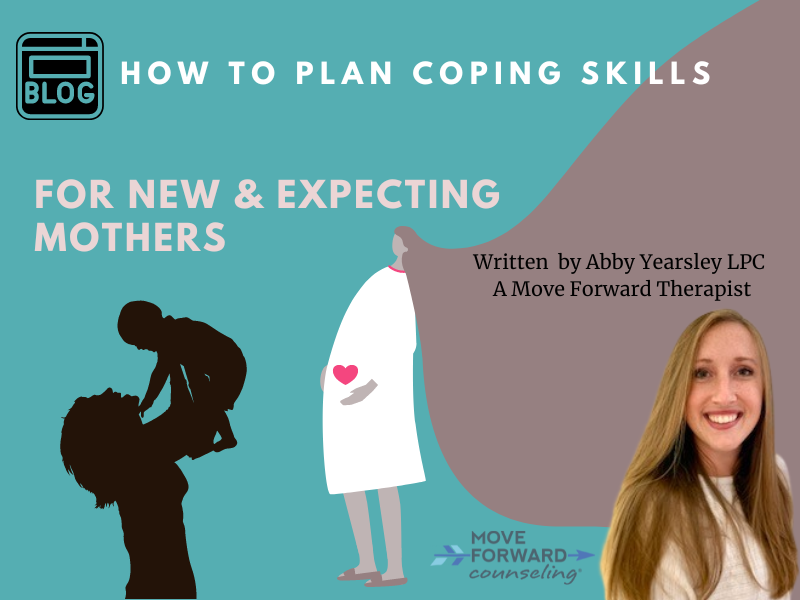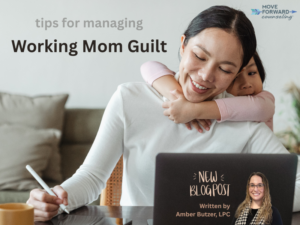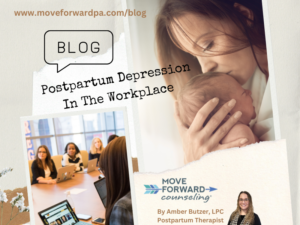Coping Skills For New Mothers
How to plan coping skills for new and expecting mothers.
We’ve all heard the comments before:
- “Just wait until you hold that bundle of joy – you’ll feel so much love,”
- “Birth and motherhood are the most amazing experiences,” or even
- “Just be grateful for a healthy baby.”
While this may be the perspective or experience of some women, it does not represent all or even most mothers’ experiences entirely. Indeed, there is room for love, gratitude, and awe for many expecting and postpartum mothers – but what we sometimes fail to give enough attention to are the more challenging, less warm-and-fuzzy emotions and thoughts. For every woman who experiences unconditional love, there is another woman (or even the same woman) who grieves the loss of her independence.
Some women battle anxiety about protecting their children, feel distant from their partners and friends, and look in the mirror and see a stranger. These are the same women who feel even more isolated when they hear comments about how happy they should be or see social media posts of carefully curated family pictures where every blemish and secret is retouched to perfection.
Regardless of their pregnancy and postpartum journey, all women will experience exhaustion, negative emotions, and stress. How can we, as individuals, communities, and organizations, support the whole picture of motherhood with empathy, acceptance, and validation? We can start by encouraging proactive and reactive coping skills.
Proactive Coping Skills for New Mothers
Proactive coping skills occur as a protective measure against stress and crisis. The following are just a few examples of how expecting and post-partum mothers can prepare for the mental/physical load of childbirth and motherhood:
1. Financial Planning
Discuss with a partner or support system members how you plan to handle the medical bills associated with birth. Reach out to institutions such as Her Traditions Bank that provide guidance and opportunity for women to put a plan in place to manage their money and reduce financial strain.
2. Meal Train
Set up a meal train with community members, faith, or personal support systems. Don’t hesitate to ask members of those systems how to set up a meal train ahead of time. You’ll be surprised to learn about people’s willingness to help.
3. Night-Time Doula
Consider hiring a night-time doula, caretaker, or nanny if you do not have a partner to support you in the feeding schedule.
4. Ask For Help
Reach out to family, friends, your local church, community programs, and moms’ groups on social media. Please read the rules established for the group to ensure they hold value in supportive, respectful interaction & sharing. Peer support can help you know you aren’t alone in your experience.
5. Schedule Visitors
Schedule visits before the birth so that you have a constant stream of support to help you clean, take a break, practice self-care, and lend a listening ear.
6. Self-Care Emergency Box
Create your self-care box. It can contain lotions, healing ointments, wipes, favorite snacks, water bottles, a gratitude journal, favorite books, and anything that helps you care for yourself. This box is for you, as a mother. Have fun and set yourself up for some pampering. At some point, it may need replenishing- but that is why you have scheduled visitors – to help you restock!
There are numerous ways that mothers can anticipate barriers and areas of need. Having some of these steps in place can be enormously helpful so that, when lack of sleep or hormones takes over, you have a plan.
Reactive Coping Skills for New Mothers
Despite proactively “coping,” there will inevitably be a moment that was not accounted for when emotions and exhaustion overwhelm. In those moments, research shows that while interpersonal relationships are the most important, there are also ways to engage in reactive coping.
1. Vent!
Vent to a partner, family member, or friend. Hearing and being understood by those closest to us reduces feelings of isolation, guilt, and resentment. It is crucial to maintaining our mental health. It’s okay and important to experience and share your feelings. Just talk.
2. Eat and Hydrate
Have high-protein snacks, whole foods, and water available. It is easy for mothers to forget their own needs in the face of their baby’s needs.
3. Talk to a Professional
An unbiased, validating presence can make all the difference for a mother who needs someone to understand the stress of her feelings. You can get connected through your healthcare provider, calling your insurance company, asking someone for a referral, or reviewing the therapist listing in your area on the Psychology Today website. Teletherapy, or online therapy, is well accepted and available now. You can ask to be matched with a therapist who offers counseling from the comfort of your home.
4. Practice Opposite Action
Opposite Action is a DBT technique that can intentionally engage in a preferred behavior. For example, when my daughter woke up at 5 am every day after multiple feedings at night, I would come downstairs exhausted and irritable. To help myself start the day on a more positive note for her and me, I would play Pharrell’s ‘Happy’ and dance around the kitchen while she watched me from her bouncer. It ended up putting a smile on my face and hers, no matter how tired I felt.
5. Take Breaks
Take advantage of opportunities to have a break or go outside (or both simultaneously)! Do not feel guilty for wanting time to yourself or structuring your child’s activities at times around your own needs. You are human and deserve all the love and attention you give to your child. Make time for both of you.
In short, Post-partum Mood Disorders can affect anyone. They are far more prevalent than many realize and are often not treated thoroughly. Their symptoms can create a lonely and emotional experience for mothers and their partners. If you or anyone you know is struggling through pregnancy and motherhood, do not feel ashamed- ask for help.
You can be a fantastic mother and still struggle with your mental health. Prioritize yourself – the extra care you give to yourself will inevitably trickle down to your partner and child. Keep reminding yourself -you can do this!
Read about Abby or request an appointment with her her to learn how to plan coping skills for new and expecting mothers.
Resources
25 Ways to Handle the Stress of a New Baby, Written Grow by WebMD




























